#jing xi || interactions
Text
jing xi & qi yan ( @mvsicinthedvrk )
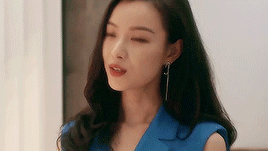
"is there a point to the different flavours of coffee?" she asked, looking to the other beside her in the line. "what's wrong with just regular coffee with sugar?" not that she was much a fan of coffee, but it wasn't all too bad. "it all seems a bit excessive to me, if I'm being honest."
7 notes
·
View notes
Text
@lavendaers for Jing Qi
"Would you like to visit the Gems and Minerals with me?" Wu Xi asks. "I think you would like them." And Wu Xi already thinks Jing Qi is the brightest gem so he just wants to compare.
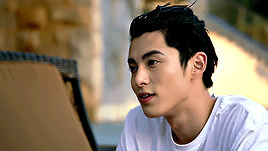
#You must not drink or fool around until you are healed (Wu Xi interacts)#Tell me… if I secretly kidnap you back to Nanjiang would Helian Yi want to go to war? (Jing Beiyuan)#lavendaers#muse: jing qi
15 notes
·
View notes
Text
@coreofgold jing qi for wu xi
22. though relatively empty the plant life whispers threats and warnings to people in this portion of the maze. It tells them to give up on their progress
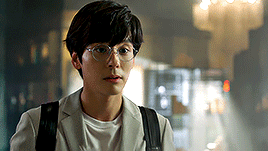
jing qi glanced at his husband, regretting pulling the other in because he was curious about what was inside the maze. he should've known better, but he hadn't been able to help himself. "i'm sorry, wu xi. you're stuck in here all because of me." he shook his head, glancing down at the ground, almost positive he could hear someone whispering that they should just give up.
15 notes
·
View notes
Text
I need to talk about Wen Kexing’s 1st meeting with Jing Beiyuan and Wu Xi in TYK for a sec cuz it’s hilarious. Like Wen Kexing and Wu Xi sorta just make eye contact and silently nod at each other in a “2 creatures staring at each other” kind of way that makes me desperately want to read a fic where they just hang out and vibe together. And then Wen Kexing looks at Jing Beiyuan and goes from “omg this is literally the hottest guy I’ve ever seen in my life” to “I am 10 seconds away from murdering this pretentious asshole” after like. 5 minutes of interaction with him (or however long it takes Zhou Zishu to take off his face mask and start chatting with Jing Beiyuan) and it’s so funny
#I like the drama in SHL of Xiyuan appearing when Wen Kexing is in the middle of losing it and all#but I will admit SHL did rob us of the hilarity of the TYK meeting#moonie posting#tyk
5 notes
·
View notes
Text
Everyone, I present you a spam of Qi Ye’s quotes that made me smile. I mainly do this for myself, as I won’t keep those screenshots eternally in my phone, but I want to be able to read them and find them when I want. Also, if you’ve been curious about Jing Beiyuan and Wu Xi like I have, maybe this can give you the little push needed to start reading the novel, or just quench your curiosity with these few interactions (and other).
I just finished reading Chichi’s translation which you can find here. Many many thanks for allowing me and many more to read this novel.
Without further ado, here are Qi Ye’s quotes that made me smile; in various posts, as I have too many
Part 1
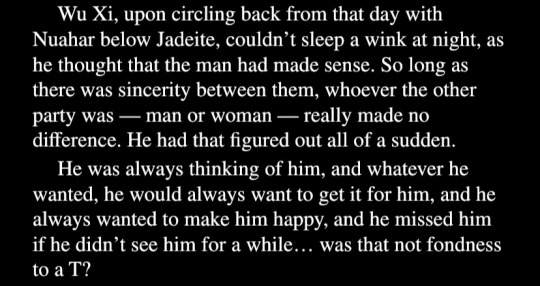
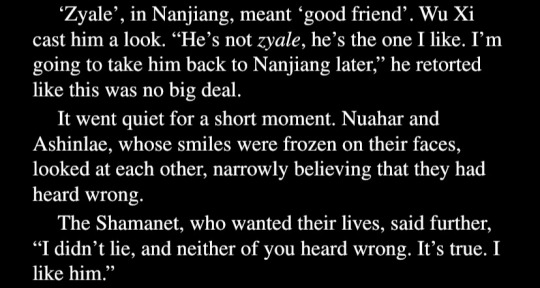
Wu Xi figuring out he likes Jing Beiyuan and saying so to his bodyguards.
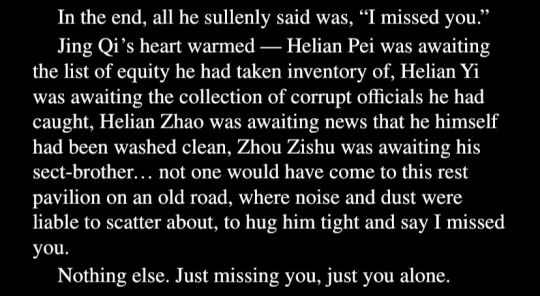
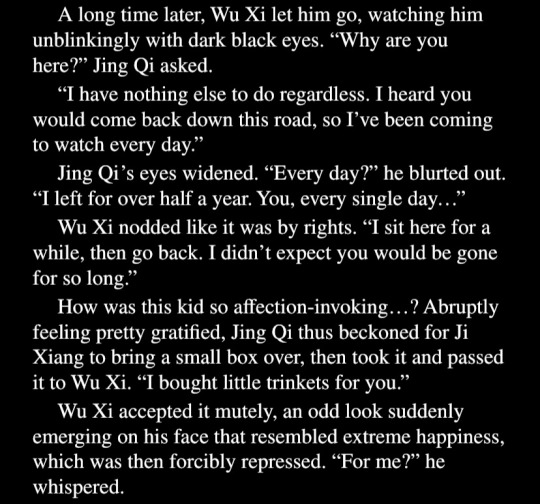
They’re just very fond of each other you see…
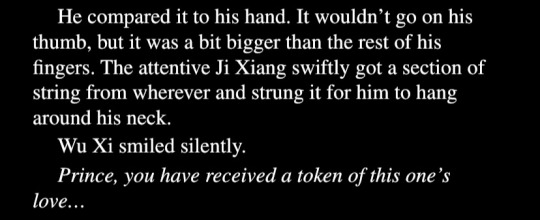
Wu Xi gifted Jing Beiyuan a ring which was a heirloom that you supposedly only give to your one-true-love… Isn’t that romantic
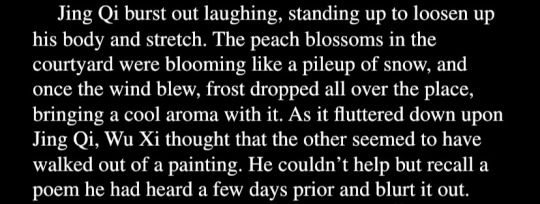

Wu Xi and his gay panic™️
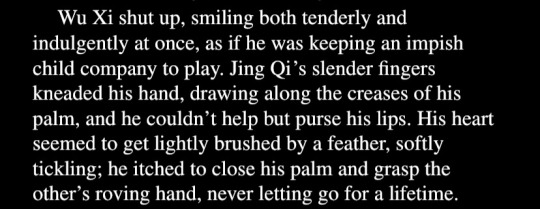
Them.
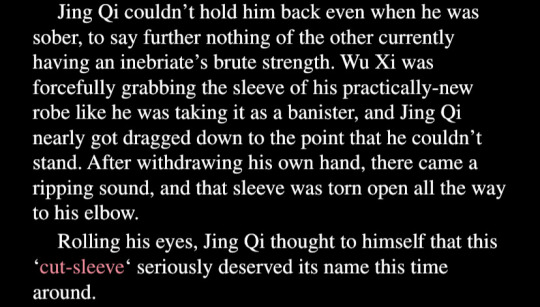
I just find this very funny

Loved the translator’s notes
4 notes
·
View notes
Text
“Zhu Xi’s ingenious solution was a two-pronged approach to cultivation that involved nurturing one’s feeling of reverence (jing) while investigating things to discern their defining patterns (li). Reverence, a virtue taught by Confucius (551-479 BCE) and the classics, serves to purify the mind, attune one to the promptings of the original good nature and impel one to act with appropriateness (yi).
At the same time, by grasping the defining, interactive patterns that constitute the world, society, people and upright conduct, one gains the key to acting appropriately. The mind that is imbued with a feeling of reverence and comprehends these patterns will develop into a good will (zhuzai) dedicated to rectitude and appropriate conduct.”
Zhu Xi (Chu Hsi, 1130—1200)
from Internet Encyclopedia of Philosophy at https://iep.utm.edu/zhu-xi/
#zhu xi#confucianism#Confucius#chinese classics#chu hsi#eastern philosophy#taoism#buddhism#religion#spirituality#history#philosophy#history of philosophy
2 notes
·
View notes
Photo
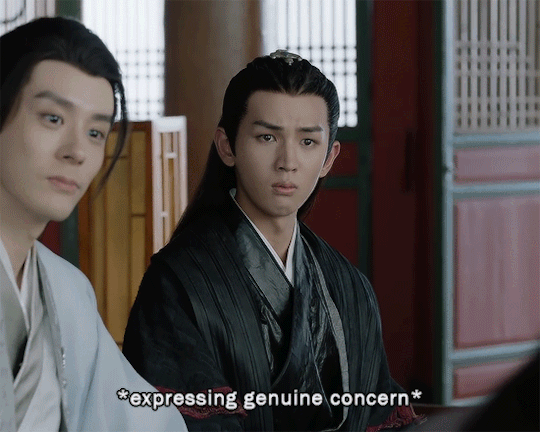
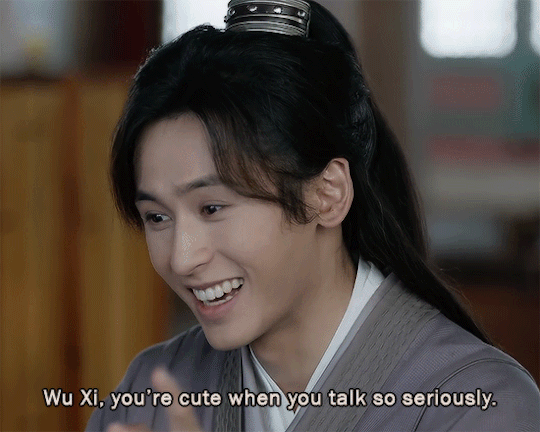
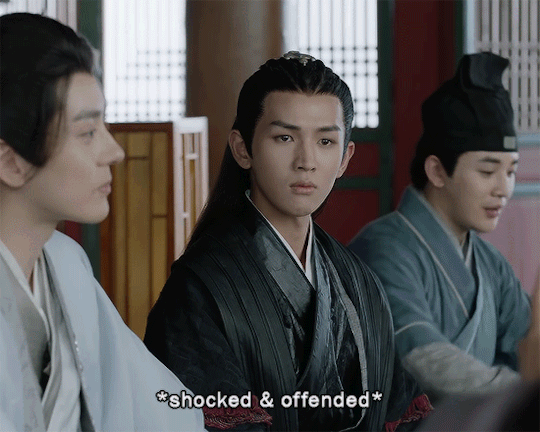
what’s a little teasing between old friends || Word of Honor, episode 32
#mf his husband is Right there come on#not gonna lie reading qiye and seeing young zzs interacting with xiyuan... i really dont know how to act normal re-watching these scenes#word of honor#shan he ling#zhou zishu#wu xi#jing beiyuan#shl#m#tyk!wkx getting jealous of beiyuan is so fucking funny maybe he was concerned about the wrong person#they just.... besties.... they.... im so glad they were in shl even if their role was even smaller than it was in the novel#no like actually why were they even there. in the book wuxi saves zzs basically but in the drama he just. doesnt. do that.#//shl creators giving us xiyuan// enjoy. one more pair of gay bitches.
220 notes
·
View notes
Text
slapdash thoughts after finishing 《七爷》
head empty, no thoughts, spoilers in bullet-point form below the cut
interestingly enough I feel like the book to read in conversation with 《七爷》 should be 《琅琊榜》 Lang Ya Bang / The Rankings of Langya / Nirvana in Fire, because both revolve around the themes of morality and personhood amidst political intrigue and sabotage, and while 《琅琊榜》 is much more optimistic about the ability of good to triumph over evil/corruption, I do think that 《七爷》 offers its readers a cast of characters with grayer morality and bloodier hands, and challenges us to believe that, despite the atrocities they’ve committed, they are still the best people for the job
I just think that Helian Yi is such a fascinating case study and argument of a person; the way his character interacts with themes of morality and leadership, rulership and fealty, love and sacrifice is so delightfully complex
because at the end of the day, Helian Yi is a great ruler. and in a weird inverse of that Black Panther quote (“you are a good man, and it is hard for a good man to be king”), Helian Yi is not necessarily pure of heart and method, but he is a damn good ruler
at least, a damn sight better than his brothers
and how the author sends all of that up in smoke, because by the end of the book, Helian Yi, and Zhou Zishu, and Jing Beiyuan all find that their petty stratagems and flashes of cunning and devious little plans are nothing in the face of actual enemies at their gates
so you’ve thrown away your humanity for power, the book says by the final battle. so what? does that make you any more capable of defending your kingdom, when the enemy you must confront is no longer your brother’s smiling face, but literal armies camped on your doorstep, and no reinforcements on the horizon?
and what wins the day in the end? humanity. not even love, because saying that Wu Xi’s love for Jing Beiyuan secured the survival of Da Qing cheapens the immensity of the sacrifice and the depth of the thought involved in the decision
it’s desire mixed with profit mixed with pride mixed with strategy mixed with faith mixed with devotion mixed with furious, bloody-minded violence, that primal logic of fear and hatred and superstition and belief and terror and stubbornness and a healthy dose of “well, fuck it”
likewise, mapping the relationships of knowing between the characters is a fascinating exploration of character dynamics: again and again, we have characters look at each other and, with a start, realize that they never knew the other at all
Jing Beiyuan remarks to Wu Xi at some point that he’s afraid of Helian Yi because he cannot understand the depths of Helian Yi’s thoughts and suspicions, cannot see through Helian Yi and map his motivations and reactions
there’s an extended sequence near the end of the book where Jing Beiyuan and Helian Yi profoundly misunderstand each other: Helian Yi keeps staring at Jing Beiyuan because 1) he’s in love with Jing Beiyuan (awkward) and 2) he is trying to figure out if Jing Beiyuan is secretly his half-brother, and while Jing Beiyuan notices (and keeps his noticing under wraps), he thinks that Helian Yi is suspicious of him, might think that Jing Beiyuan himself is interested in that dragon throne when Jing Beiyuan most profoundly is not
and this confusion never gets resolved, just pushed aside when war comes to their doorstep, and then Jing Beiyuan leaves the capitol without saying goodbye, without even letting Helian Yi know that he’s still alive
there is something so profoundly and quietly heartbreaking about the fact that Jing Beiyuan would rather Helian Yi think that he’s dead than say goodbye
first life!Helian Yi, in the third fanwai, also notes that he doesn’t think he truly understood Jing Beiyuan either, which was actually a reason why first life!Helian Yi was afraid of Jing Beiyuan--here was a man who’d grown up with him since childhood, who could read his slightest glance, a wordless command in the twist of his voice, and yet Helian Yi looked at Jing Beiyuan and could not see beyond the bland smile and its deep shadows
likewise, Wu Xi never truly understands Jing Beiyuan--Jing Beiyuan never ends up telling anyone about the reincarnation business, and the number of times Wu Xi is caught totally flat-footed by Jing Beiyuan’s unexpected laughter, or anger, or actions, far outnumbers the times that they’ve been able to look at each other wordlessly, nod, and move in synchronicity
does that even happen? I actually think it’s quite remarkable that the two of them don’t necessarily get each other; their relationship seems founded, instead, on novelty
Jing Beiyuan, to Wu Xi, blends perfectly that mix of known and unknown, friendly and strange, familiar and foreign. Jing Beiyuan is Wu Xi’s first and only crush, first and only infatuation, first and only love, which speaks more to Wu Xi’s character than to anything about Jing Beiyuan himself
meanwhile, for Jing Beiyuan, who’s been around the block more times than he cares for and is 300 years into this life, literally gives no more fucks about relationships and love, doesn’t care to look for it, doesn’t feel it missing from his life, doesn’t place his hopes and happiness in other people because other people never place his hopes and happiness before their own, so for Wu Xi to surprise him (already quite a feat in and of itself, because again, Jing Beiyuan is 300 years old), for Wu Xi to move Jing Beiyuan with the strength of his passion and the purity of his emotions, is actually incredible
hilariously enough, the one (1) relationship of True Knowing (TM) in this book is actually Zhou Zishu and Jing Beiyuan, as 酒中知己. where is my 30k fanwai of wacky hijinks of these two being dumbasses together. I want it
okay but I’m still thinking about Helian Yi, because the more I think about it, the more I’m coming down on the side of “《山河令》did Helian Yi dirty,” and/or 晋王 in 《山河令》 simply wasn’t Helian Yi at all
I think I prefer the latter, because there are aspects of worldbuilding and characterization in 《山河令》 that suggest that the events of 《七爷》 didn’t occur, or didn’t occur in the same way
look I’m just saying that 《山河令》!Zhou Zishu does not read as someone who has fought in a literal war
not that 《山河令》!Zhou Zishu isn’t familiar with death, and destruction, and carnage
but you really have to read 《七爷》 to get a feel for the vastness of war, the bleakness of long, hopeless months, the yawning maw of defeat and everything they’ve fought for going up in smoke
I’m sure I will have more thoughts (and more well-founded thoughts) on this after finishing 《天涯客》, but for now I think I’m going to walk away from 《七爷》 with many more Helian Yi thoughts and feelings than I expected
137 notes
·
View notes
Text
jing xi & wei wuxian ( @mvsicinthedvrk )
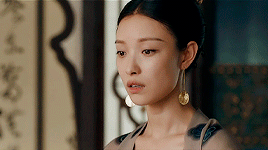
"this place is so strange," it was nothing like she'd ever experienced before - and the strange looks she had been getting from people unnerved her. "you'd think that people had never seen a cultivator before," not that she had truly seen anyone who wasn't family in years - so it was nice to be out of that house, even if it was under strange circumstances.
8 notes
·
View notes
Text
@lavendaers for Jing Qi
"Are you busy today?" Wu Xi nonchalantly asks Jing Qi, feeding his many exotic pets.
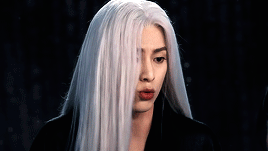
#You must not drink or fool around until you are healed (Wu Xi interacts)#Tell me… if I secretly kidnap you back to Nanjiang would Helian Yi want to go to war? (Jing Beiyuan)#lavendaers#muse: jing qi
2 notes
·
View notes
Text
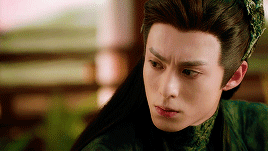
jing qi had gone out, his plan was to get a few things from the grocery store he’d been to with his husband to get a few things and make them a nice meal. while he wasn’t really sure what valentine’s day was, he wanted to celebrate it with wu xi since it seemed to mostly be for couples. that was where he was when the chaos started. his first thought was to find his husband and make sure that nothing had happened to him and he had a feeling that the other’s thoughts were pretty much the same so he decided to stay in one place and just wait at the grocery store. wu xi would come for him, he was certain of that.
@coreofgold jing qi for wu xi
14 notes
·
View notes
Text
forewarning: this post uses critical tone towards a certain scene in Word of Honor (specifically, ep.9’s “... that you’re actually crazy” scene). If you’re not in the mood for reading such thing, please be kind to yourself and scroll past this post.
Ok, I think I worked out what bothered me the most about “I didn't realize that you’re actually crazy” scene in SHL – I mean, lots of things about it bother me, but I did know they’d bleach out the grey morality for c-nsorship reasons, so I should’ve been ready for some ridiculous righteousness coming from the mouth of mr.childmurder… but, ok, you see, the truly disturbing thing about this scene is how similar it feels to what happened between Zishu and Jiuxiao in the novels.
Novel Zhou Zishu has always shielded his too-honest, too-righteous shidi from the realities of what he does for the Crown Prince. But then Liang Jiuxiao finds out. Finds out that his shixiong, the person he admired deeply, the person he wanted to travel jianghu with, was the one who exterminated the whole family of a loyal official, including a four-year-old child they all knew and played with and loved. Understandably, Jiuxiao freaks out, and confronts Zhou Zishu – going as far as telling him that murderers should pay with their lives… To put it shortly, Liang Jiuxiao sees Zhou Zishu’s true face for the first time, and is horrified by it.
This is almost beat by beat what happened in SHL – Zhou Zishu sees the extent of hatred Wen Kexing (the person he wanted to travel jianghu with) is capable of, and rejects him over it.
And even the fallout is similar – in the novel, Zhou Zishu internalizes what Jiuxiao said to the point that it largely informs his decision to use the nails; in the show, it is this rejection that leads to Wen Kexing trying to hide his identity as the Valley Master, and to him internalizing the idea that his life is worth less than Zishu’s.
And look, I think the show didn’t mention Jiuxiao confronting Zhou Zishu over the murder of the Jiang family (unless I missed something in conversation?), so maybe it didn’t happen in the show’s canon – but I certainly didn’t know that when watching the scene, so to see Zhou Zishu inflict on Wen Kexing exactly the kind of emotional damage that made novel Zishu want to stab himself full of nails and go die was… disturbing, to put it mildly.
Anyway, if the confrontation between ZZS and LJX didn’t happen, then... Okay, it’s impossible to tell if the similarity between scenes is coincidental or not, but there are a few other beats in show!wenzhou’s relationship that feel pulled out of qi ye (like, drugging your lover so they’d be safe while you go off to do something incredibly dangerous that will almost certainly kill you? not something novel wenzhou ever did or would do, but jing beiyuan sure did just that to wu xi), so I can’t help but feel like this one is too; and if it isn’t coincidental, if the Zishu and Jiuxiao’s story in Qi Ye was taken as inspiration for something between SHL’s wenzhou… that also feels deeply wrong, because the novel reiterates several times that relationship between Zishu and Jiuxiao and Zishu and Kexing are fundamentally different.
...But, of course, show’s wenzhou is also completely different from novel’s wenzhou. I guess in the grand scheme of things this scene might not even be the biggest divergence from their novel interactions, just the first glaringly obvious one, and maybe that’s part of the reason my brain got so caught up on it – either way, writing this helped me work out some of my feelings regarding it, so I’m going to cut off this stream of consciousness here.
––––––
- TYK/SHL comparisons masterpost -
- tyk meta masterpost -
#ofc the first thing that tripped me up in this scene was seeing zzs have /morals/#and being disturbed by something wen kexing does (that isnt flirting)#because novel zzs is self-aware enough to know his crimes are... as bad or worse#but this is. probably c-nsorship. for my peace of mind im gonna tell myself its bcus of c-nsorship#but i felt there was something else niggling at my mind and i finally worked it out#wenzhou#zhou zishu#liang jiuxiao#wen kexing#qi ye#tian ya ke#word of honor#tian ya ke meta#word of honor meta#(btw did you know that in the novel zzs only calls wkx crazy over flirting with/liking him. never anything else.)#(its really wkx: i like you <3 zzs: sounds bad get well soon)#tyk shl comparisons
71 notes
·
View notes
Text
REVIEW: 山河令 Shān Hé Lìng (Word of Honor)
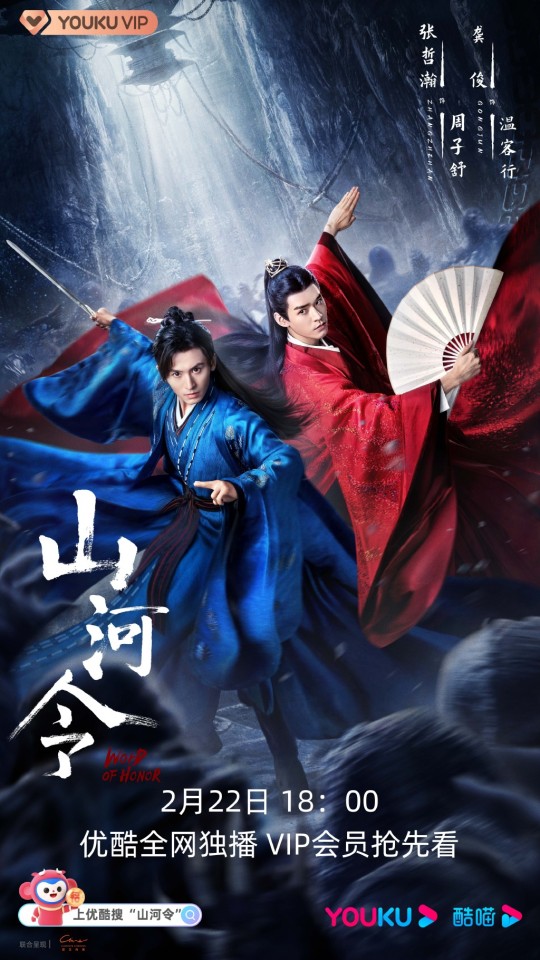
Note(s):
(Very) long post ahead
Contains spoiler
This is my personal review and does not represent the entire audience.
This review is written by someone who has read the original novel, hence there will be reference and comparison between the two works
Summary:
After the sudden passing of his beloved master, young leader of the famous Four Season Manor, Zhou Zishu, brought his brothers and loyal followers to serve the Prince of Jin whose family had been the master of his predecessors, creating a secret organization of capable spies and assassins known as "Tian Chuang".
His decision later proved to be the downfall of his sect, however, for they were quickly swallowed into ruthless political conflicts and battle for power within the royal families, causing his brothers and followers to die unjustly one after another.
Ten years later, Zhou Zishu, now the sole survivor of the Four Season Manor, resigned from his position as the leader of Tian Chuang. In exchange for freedom, he bestowed upon himself the fatal punishment that is the "Nails of Seven Apertures for Three Autumns", a torture device created by Zhou Zishu himself that would gradually numb one's five senses and ultimately took their life within three years.
After several months passed, the now free Zhou Zishu had disguised himself as a wandering vagrant, enjoying his remaining time sightseeing, drinking, and sunbathing to his heart's content.
As fate would have it, however, his unshackled days abruptly ended when he saved a young boy, the only surviving descendant of the Mirror Lake Sect, one of the renowned Five Lakes Alliance, that was destroyed overnight by the mysterious ghosts of Mount Qingya. He was soon pulled into a conflict of the pugilist world dating back to twenty years ago, revolving around a legendary "Glazed Armor" said to hold the key to a secret armory filled with the secret techniques of martial sects from all over the world.
To further complicate matters, he somehow caught the interest of a strange young man of mysterious origin, Wen Kexing, who pursued him relentlessly with unknown motive.
---------
Before we get into it, I feel that it is worth to mention some of the major differences between the novel and live action because they do affect my impression and judgment over several points in the drama.
While there are always bound to be differences between an adaptation and its original works, most of these differences seem to have been made to avoid censorship, also in order for the drama to be able to become a "stand-alone" story (since the original work is a sequel to another novel).
1. Zhou Zishu and Wen Kexing
In the drama, they are later revealed to have once been martial brothers of the Four Season Manor due to the fact that Zhou Zishu's master saved Wen Kexing's parents when they were pursued by both the righteous sects of the jianghu and the ghosts of Mount Qingya over the key of the Glazed Armor.
In the original story, they were strangers to each other that have no relationship whatsoever prior to their coincidental meeting at Jiangnan.
2. Prince of Jin and Tian Chuang
Word of Honor is based on the novel "Faraway Wanderers" by Priest, which is a sequel to her previous novel "Lord Seventh".
Originally, the master that Zhou Zishu and his Tian Chuang served should be the Emperor himself, Helian Yi, an important character from Lord Seventh - in which Zhou Zishu also made a major appearance. After Zhou Zishu punished himself with the nails and left Tian Chuang, Helian Yi and the Tian Chuang never pursued him. The story follows Zhou Zishu's journey in the jianghu and he never once went back to the capital city where Helian Yi was.
In the live action, Zhou Zishu and Tian Chuang served the Prince of Jin, a royal family tangled in internal strife for power. From what I understand, Prince Jin seems to have an ambition to overthrow the ruling Emperor to become one himself. After Zhou Zishu left, he kept an eye on him and later managed to capture Zhou Zishu, briefly bringing him back to the Jin as a prisoner.
3. The Scorpions
In Word of Honor, the Scorpion King Xie-er was portrayed as the adopted son of Zhao Jing, the main villain of the story. All the plots he devised, most of them were made with Zhao Jing's interest in his mind. There were also four remarkable assassins working under him (I don't remember their names, but you know who I mean, right?).
Originally, the Scorpions are an independent assassin group. Their relationship with Zhao Jing is that of client and service provider. The Scorpion King had his own plan to benefit himself and his organization with only his own interest in mind. There were no particular members of the Scorpions featured in the story other than him. Specifically, the Phantom Musician Qin Song was an independent assassin hired to kill Zhang Chengling, and he was believed to be dead after being defeated by Zhou Zishu on his very first attempt.
4. The Ten Ghosts of Qingya
Although the novel did mention the existence of the Top Ten Ghosts, only 4 (four) of them actually appeared in the story:
Xue Fang the Hanged Ghost (who was secretly killed by Wen Kexing in the beginning of the story, both in the novel and drama)
The Long-tongued Ghost who was also killed by Wen Kexing when he and Zhou Zishu were trapped underground in the graveyard (Zhao Family's Funeral Home in the drama)
Sun Ding the Delighted Mourning Ghost, one of the strongest ghosts who wanted to overthrow Wen Kexing's position as Ghost Valley Master; he was later killed by the Scorpions
Lao Meng (I forgot his title), also one of the strongest ghosts who wanted to overthrow Wen Kexing, but he was more lowkey and calm; he worked together with the Scorpions to first kill Sun Ding (his rival) and later to kill Wen Kexing when the jianghu heroes came to attack the Ghost Valley (although he didn't know that the Scorpion King had his own plan, hence meeting his demise during the war)
Wu Chang and his two henchmen, the Tragicomic Ghost, the Laughing Ghost, etc do not exist in the novel.
Additionally, Liu Qianqiao is also not part of the ghosts in the novel. She did have an affair with Yu Qiufeng and was manipulated by him until she died horribly in the hands of the two old couple (whose names I also forget).
5. The Ending
I think this is probably the biggest difference between the novel and the live action.
Originally, Zhou Zishu's nail wounds were removed and healed completely by Wu Xi AFTER the final battle at Mount Fengya (yes, the mountain's name is slightly different). He, Wen Kexing, Zhang Chengling, Jing Beiyuan, and Wu Xi lived temporarily at the top of Mount Changming because they need cold temperature for the healing method to work.
Wen Kexing did not sacrifice his life to restore Zhou Zishu's meridian and they did not become immortal.
Also, the Scorpion King was killed by Zhang Chengling and Gao Xiaolian after he got his hand chopped of by Zhou Zishu for trying to murder the already dying Wen Kexing (after he took his revenge on Mo Huaiyang).
There are of course, still many more differences, including when and where Cao Weining died, but the five things I mentioned above are probably the biggest ones because they directly impacted the entire plot.
---------
STORY: 8/10
Despite the changes and adjustments, the main plot of SHL amazingly remains loyal to the original story. The things they could not show, they would include it in the characters' dialog or tried to incorporate it in another way. Some examples:
Cao Weining and Gu Xiang's reincarnation story was included in Cao Weining's dialog (his dream and his wish to grow up together with her in their next life)
Wen Kexing's confession about wanting to build a grave for his parents from the Extra Chapter (where he cried and caused Zhou Zishu to let him top out of sympathy) was included in Wen Kexing's dialog when he got drunk and hugged Zhou Zishu after he defeated Zhao Jing (prior to Cao Weining and Gu Xiang's marriage)
In fact, I feel that most of the adjustments made to the story were able to deliver much better emotional aspects and intensity of the characters and important scenes.
Although more than half of the Ten Ghosts were made up solely for the drama, their existence was able to better portray Wen Kexing's image as the supreme leader of the Ghost Valley and why they all fear him.
Although many interactions between Zhou Zishu, Zhang Chengling, and Wen Kexing were either added or changed from the novel, here we could see them as a real, close family which is so much more heartwarming than the original.
Zhao Jing's pretense, evil deeds, and downfall were all arranged neatly from the beginning. If I hadn't read the novel, I probably would've been (pleasantly) surprised when it was revealed that he was the one plotting everything behind the scene.
The romance and relationship development of the main pairing (Wen Kexing/Zhou Zishu, although it was masked as brotherhood as always) and side pairing (Cao Weining/Gu Xiang) were especially well done. It allows me, as the audience, to get to know them, sympathize with them, and ultimately rooting for them (despite already knowing how Cao Weining and Gu Xiang would end up).
Gu Xiang's anguish and fury after Cao Weining died were shown so clearly. Her final fighting scene until her death was particularly moving.
Explanations and plot twists were spread evenly so there was no info dump. The plot development was enjoyable to follow from the beginning, even if the ending felt a bit rushed.
This was a bit difficult to describe, but even if sometimes I feel like "hmm, this character did not do this in the novel", when I was following the drama from the first to the last episode, everything flows smoothly and does not feel out of place. So I realized that even if what the characters did was sometimes different from the original story, it is still loyal to the plot and circumstances of the drama, which is why their adjusted words and actions still felt natural to see.
Also, when reading the novel before, I have one critic about the Glazed Armor and the armory itself being the center of everyone's fight, but in the end they didn't seem to have much importance, especially because the armory was never found and opened. At the very least, although it was due to ending change and pretty much rushed, in SHL the Glazed Armor was actually used and the armory was shown.
Though there were indeed a few things that I do not quite agree(?) with:
Tian Chuang is supposed to be a secret organization that does their job secretly, but why is it that they always light so many lanterns when launching their attack?
The bond shared between Zhou Zishu and Prince Jin was pretty clear, but I don't think it's detailed and deep enough for Prince Jin to consider Zhou Zishu his soulmate. Furthermore, from the beginning we've never been told about Zhou Zishu's family, but in the last few episodes suddenly there were talks about his father being branded a traitor because of some secret hidden in the armory. While the story makes sense, to put new information out of the blue when the plot was about to end feels somewhat strange.
Lastly, I understand that danmei adaptations always face a lot of restrictions, as in they were not allowed to have a blatant happy ending - so most either resort to tragedy or open ending (cmiiw). However, I still feel that Wen Kexing faking his death without telling Zhou Zishu was......kind of silly.
After their life was spared by Ye Baiyi, Zhou Zishu had already warned him not to act without telling him again. When he wanted to fake his death, Wen Kexing told almost everyone except Zhou Zishu, the reason being they shouldn't make Zhou Zishu fight since he was in the middle of recovery.
Zhou Zishu is a rational person, I strongly believe that he would understand if Wen Kexing explained clearly. Him not telling Zhou Zishu led to:
Zhou Zishu actually ended up fighting to save him
Zhou Zishu thinking his soulmate is truly gone and proceeded to choose a suicidal move in order to avenge his (fake) death
Honestly, while I still enjoy following this drama until the end, I feel that the cause of Zhou Zishu dying when he could've been saved by Wu Xi, and Wen Kexing ended up sacrificing his life to save Zhou Zishu, was a bit ridiculous because really, Wen Kexing brought it upon himself.
In regards to this, even if I'm happy the two of them ended up living happily ever after as immortals on the mountain, it makes Jing Beiyuan and Wu Xi's existence almost pointless. They were literally included in the story of Faraway Wanderers to save Zhou Zishu's life from the nails. But here, other than providing shelter after the Four Season Manor was burnt down by Duan Pengju, I don't see any reason why they should be there.
CHARACTERS: 9/10
Perfect casts and perfect character portrayals, both from visual aspects and acting. Some may or may not necessarily look 100% similar to their novel description, but they managed to bring out the characters to life so well.
I've said before that most adjustments made to the drama were able to deliver much better emotional aspects and intensity, and this is especially true for the characters.
Honestly, when reading the novel, other than the few main characters, others did not leave a lot of impressions on me. I don't even remember what Zhao Jing was like when he was revealed as the true villain. Gao Chong's introduction was pretty good, but then we didn't hear much about him until he was finally declared dead. Shen Shen appeared only for one chapter and the next time I heard of him, he's already dead, too.
I love the novel, but really do have so many complaints about the characters in there. Fortunately, all of these flaws had been fixed in the drama, and boy they did it so well.
Some that I found amazingly written and shown:
Wen Kexing's emotional instability and his protectiveness whenever Zhou Zishu got hurt (good job, Gong Jun)
Zhou Zishu's rich emotions to those he hold dear (good job, Zhang Zhehan)
Zhang Chengling's character being more detailed and "alive", especially his diligence, growth, and occasional mischief; he was no longer just a useless dumb kid who can't do anything
Cao Weining and Gu Xiang's dynamic is so lovely
Zhao Jing's change from the seemingly weak guy to an ambitious, manipulative mastermind
Gao Chong, Shen Shen, and many other side characters were given enough screen time + sufficient important scenes so they weren't easily forgotten
Special shoutout and kudos to the actor who played Duan Pengju. I heard he was actually the Assistant Director, but because they didn't have much budget, he was casted to play this character and he did great 🥺 Thank you for helping the team to save hundred thousands yuan!
I don't really have any complaints about the character except when Zhou Zishu and Wen Kexing have just delivered Zhang Chengling to Zhao Jing, Zhou Zishu clearly didn't want to mention his name (Zhou Xu), but Wen Kexing went ahead and introduced the both of them. Somehow I feel that Wen Kexing's character wouldn't disregard Zhou Zishu's opinion so lightly.
TECHNICAL ASPECTS: 9/10
Although this drama did not have much budget to start with, literally the only complaints I have about it is so minor, like:
A few scene transitions don't look smooth
Repeated use of sets, e.g. Gao Chong/Zhao Jing's residence is the same as Prince Jin's Palace, the Secret Armory Interior is the same as Tian Chuang's prison - but this has been mentioned in an interview with the Director(?) that they indeed use similar sets for multiple scenes to save budget
Other than that, I only ever have good things to say about this drama.
The fighting scenes should be given million kudos. Save for the flying and gliding part (which still looks kinda awkward, but better than some other Chinese dramas I've seen), the actions were just so cool and intense??? From the angle, the slow motion, to the techniques that are unique and different for each character. They even perfectly showed Zhang Chengling's awkward yet correct implementation of Zhou Zishu's teaching.
Costume designs are top notch. The visual of the seven nails on Zhou Zishu's body looks so real. His disguise was also very well done, I almost couldn't tell it's the same actor.
Some CGI and animations could've done better, but overall everything looks nice. I'm especially amazed at the visual of Longyuan Palace.
OVERALL SCORE: 8.7/10
At this point, I don't even know how to end this post other than saying please watch it, guys. It's a really well done job despite their limitations and restrictions. I've watched several Wuxia/Xianxia dramas before this and Word of Honor surprisingly exceeded every single one of my expectations. I enjoyed watching it so much, and I believe you guys will like it, too.
An additional kudos from me personally, because you can tell how the team creating this drama knows and appreciates the original author's works. It's a pleasant surprise when they incorporated a few things from Priest's other novel:
From Sha Po Lang: Zhi Liujin (the fuels used for the puppets in Longyuan Palace) and the Mechanical Birds used by Tian Chuang + Ping An Manor to deliver letters
From Silent Reading: The puppy that young Zhou Zishu and Zhen Yan played with, it was named after the cat owned by the main character of Silent Reading (also, fun fact, the name of Silent Reading's main character is "Wenzhou")
From Lord Seventh: Wen Kexing faking his death was exactly the same as how Wu Xi fooled the Emperor in order to "kidnap" Jing Beiyuan out of the capital.
Conclusion: Please watch it, guys.
#Word of Honor#Shan He Ling#SHL#Tian Ya Ke#Faraway Wanderer#Zhou Zishu#Wen Kexing#WenZhou#Review#Danmei#Priest
94 notes
·
View notes
Note
Um, hmm - Wu Xi?
one aspect about them i love
I have so many things about him I love, it's hard to pick! He is very lovable [citation needed].
I think one thing I really like about him is his pride? It's a very particular flavour of pride: pride-as-dignity and pride-as-not-putting-himself-below-other-people. The two* scenes where he has to put a show of [wiggle hands] putting himself someone else and showing dramatic respect, the introduction to the court and the scented cat gifting scene, are such big deals for him and I love it so much.
*that I can recall
one aspect i wish more people understood about them
Hmm, one of the nice things about having a relatively obscure fave is people don't misunderstand him that much. Though I have seen some things that treat him as dumber than he actually he is? And he's not dumb, he is just aggressively straightforward and also very flustered by his crush because for most of canon he is a teenager.
one (or more) headcanon(s) i have about this character
I don't so much have a "headcanon" so much as a "deep desire for someone Who Knows Stuff to write an elaborate worldbuilding meta post that I can scavenge things from" but look. I love religious characters. I love fictional religions. Wu Xi is literally the head of a religion.
But, uh, what we get in canon is A Way. Hey Priest, do you want to try that one again, etc.
So. There are headcanons I Want To Have, but alas do not have them.
one character i love seeing them interact with
Jing Beiyuan. What can I say, I am a sap, etc.
one character i wish they would interact with/interact with more
I am aware there are plot reasons he does not get to talk with the previous Great Shaman much. But they do have such a fun dynamic.
one (or more) headcanon(s) i have that involve them and one other character
Ashinlae and Nahuar, after having spent so long dealing with teenaged Wu Xi, spend several years waiting for Wu Xi to do something Scandalous and Heart-Attack Inducing. And it's not like him declaring Jing Beiyuan as his wife is completely non-scandalous? But there's this general feeling among people who did not spend several years with a younger Wu Xi going "Why are you hovering around like he is just about do dramatic and you are the only ones who can stop him?"
8 notes
·
View notes
Text
Remembrance of Things Past - Eps 1-10 Impression/Rant
Not really a first impressions post since there are only 2 episodes left, but as I’m waiting on the last few episodes, I thought I’d rant a bit about the drama here.
First of all, I agree with everything that AvenueX said in her review of the first 6 episodes. Her review is what prompted me to start the drama. I needed a realistic slice of life drama to balance out the idol drama that is You Are My Glory (which I’m also waiting on for new episodes), and ROTP seemed to fit bill. ROTP is just so good.
I binged ROTP in 3 days. It could have been 2 days, but I started it at 2am on a Wednesday night, so I didn’t get very far the first night. Each episode is about 75 minutes long, so almost the equivalent of 2 regular lengthed episodes, but not quite.
I cried during the first two episodes. The character development is just phenomenal. You really feel for Jing Jing’s character even though you’ve only seen her character for an hour. There are little moments throughout the drama that made me tear up too, like when the girls were celebrating Nan Jia jie’s 36th birthday and I got emotional over how close their bond is, or moments when the girls reflected on their aging parents and how we often take our parents for granted.
Plot pacing and structure
The plot is tight and well-paced, and each girl’s storyline is interwoven well. Sometimes they’d cut between simultaneous scenes between the girls to compare and contrast what they’re each going through. For instance, when Xu Yan is having an argument with her boyfriend, the drama will also cut and flip back and forth to Qiao Xi Chen going through problems at her workplace. When Xu Yan makes up with her boyfriend, the drama cuts to QXC and Nan Jia being romantically pursued by Jian Yi Fan and Ou Yang. It’s interesting to see how their lives mirror and differ from each other.
Because the storylines between the girls are so interwoven and keep flipping back and forth between each other, it makes it hard to skip scenes because you can’t just skip an entire segment or else you’ll miss something important in all 3 storylines. I can see that this might be a little annoying if you have a preference for one of the girls and want to skip someone else’s storyline. But I actually like seeing all 3 of their stories play out, so I’m not bothered by it.
Another aspect about the plot’s structure that I appreciate is how they use the mystery behind Jing Jing’s suicide as a throughline for the drama. Up until episode 8ish(?), each episode ends with a question about Jing Jing’s life prior to her suicide and the next episode opens with the girls trying to find an answer or a clue to it. The girls and we the audience learn more and more about Jing Jing with each episode. However, episodes 9 and 10 deviate from the structure a bit and so the drama has recently been less and less focused on Jing Jing’s story, especially after they found out that she had depression. The drama seems to imply that her depression due to the stress of living in Beijing was the main factor that led to her suicide, while the successive unfortunate events that happened on her birthday was the trigger.
Characters
I like all the main characters in the drama, albeit some a little more than others, which I’ll explain. I think the 3 male love interests are a little too perfect though, and so I guess this slice of life drama is actually a little idealistic after all.
Xu Yan - My least favourite of the four girls. She’s materialistic, but not as spoiled as I though she would be. But it does annoy me how she keeps picking fights with Shen Zi Chang, when he’s just trying his best. He’s so tolerant and patient with her. He apologizes, they make up, and then the cycle repeats. It’s just a very unhealthy relationship, and I’m tried of seeing them fight and make up.
EDIT: So, I started writing this review when I had only watched up until episode 9, but now that I’ve finished episode 10, um, wtf?? Xu Yan made a bad choice and got scammed of all her money, her friends try to comfort her, loan her money, and tell her not to repress her emotions like Jing Jing. And then she just lashes out at them saying they have no right to comfort her because they were the ones who caused Jing Jing’s death. Xu Yan starts off blaming QXC for not knowing that Jing Jing had a crush on her boyfriend, and then she blames Nan Jia for being a bad older cousin. She blames both of them for being ignorant of Jing Jing’s depression and only caring about themselves. QXC (rightfully) retorts back than Xu Yan knew all along that Jing Jing had a crush on her boyfriend, and yet Xu Yan never told anyone, so she’s just as guilty as all of them. Honestly, I was sympathetic towards Xu Yan before, but she was just so ungrateful and entitled in that scene. What right does she have pointing fingers and assigning guilt to people? And to weaponize Jing Jing’s death against them? That’s just cruel. The argument between them in that scene at the end of episode 10 just felt so random and out of place. All of a sudden, Xu Yan points out all of these problems she has with QXC and Nan Jia, when all they’ve ever done is pamper her. Also, you can’t blame QXC for dating Lin Rui even if Jing Jing liked him first, and not to mention that QXC wasn’t even aware. QXC might not have even chosen to date Lin Rui if she had known. But it happens all the time between friends where your friend might date someone you like. All’s fair in love and war, and there’s no first come first serve rule when it comes to dating.
Jing Jing - She becomes more complex as you learn more about her. She puts her friends first and is fiercely supportive and protective of them. We get a glimpse of how far she’s willing to go for them she pulls a butcher knife from the kitchen and points it at QXC’s debt collectors in the first episode. Her friends see her as being really open, expressive, and bubbly. She’s the first one they each go to whenever they need help with a problem or want to show off an achievement. But in reality, she’s really secretive. She hides her feelings to keep her friends happy, and when they slowly uncover her secrets, she becomes less and less recognizable to them, as though she’s been living a double life all along.
At the end of episode 10, Jing Jing is described as the “hole in the tree” that everyone goes to to share their secrets, but they forget that she’s also a person with her own secrets to share, and she’s not just a tree hole to serve others. Can we blame the friends for not paying enough attention to Jing Jing and only using her for emotional support? Yes and no. It’s complicated. We should always do more to try to care for others and to be more attentive to them, but at the same time, it’s impossible to completely know a person. I purposely hide parts of my life from my friends because I don’t want them worrying or judging or commenting. So I would never expect them to be able to figure it out, and neither do I want them to figure it out. I think it’s interesting that the drama is exploring the friends’ self-imposed guilt, but I don’t agree that Xu Yan should be the one to point it out them and to be Jing Jing’s spokesperson. Xu Yan positions herself as Jing Jing’s heroic and righteous advocator, when really Xu Yan is the most problematic person out of the three remaining friends.
Also, after seeing how the friends interact, they don’t feel narcissistic. Yes, they each readily vent about their problems to each other, but they also ask about the other person. It’s not one-sided. Xu Yan talks about her problems with her boyfriend, but she also asks and cares about what’s happening in QXC’s life and vice versa. Nan Jia is more mature and is busy with her business, but she always takes the time and effort to help her friends. All of their conversations are reciprocal and they are genuinely interested in each other’s lives. So, I don’t think they have a major communication problem or that they don’t care or that they’re ignorant. Which again, makes Xu Yan’s accusations in episode 10 feel even more unfair.
Ji Nan Jia - Jing Jing’s cousin and also the oldest of the three girls (about a decade older). Sassy, witty, unapologetic, confident. She’s who you’d think of when you imagine a successful, independent, career-driven woman. She’s extremely annoyed by her mother’s nagging to get married. But she herself is trying to figure out whether she actually wants to find someone to settle down with or if she just wants to beat her biological clock and have children while she still can. She’s pursued by Ou Yang, ten years her junior, and he’s absolutely enamoured with her. He seems to be unconditionally in love with her, which is what I meant when I said that the male leads in this drama seem too perfect and idealistic. But I like Ou Yang though. He’s adorable.
Qiao Xi Chen - The main character of the four main characters. Like Nan Jia, she’s also quite sassy. In some ways, she’s like a younger version of Nan Jia. QXC is also very career driven and competitive. She’s confident and believes in her abilities, but she also gets easily overwhelmed and emotional (like when her stress and nervousness prevented her from being able to give her proposal presentation and she ran out of the room. I’ve definitely felt that way before my committee meetings). QXC is a character you can self-insert as because she represents the everyday employee who struggles with the long commute to work and tries to stand out and make a name for herself in the company. QXC is also extremely paranoid, which is understandable when you’re a woman living alone in the city. I know what it’s like to have to briskly walk home late at night and constantly having to look over your shoulder to make sure no one’s following you, or having to check your hotel room before you change, or having to make it seem like you’re not the only one living in your apartment. QXC is smart, logical, helps people when she can, but is also reasonably selfish when she needs to protect herself, like when her co-workers try to take advantage of her or throw her under the bus. She’s a character everyone can relate to.
She and Jian Yi Fan also make such a cute pairing. I love all their interactions. I love how Jian Yi Fan can’t help but smile when he’s with her, but he tries hard to clamp it down. I love how QXC is aware of her own attraction and easily admits to to Xu Yan that she does have feelings for him instead of beating around the bush. And I especially love the awkward but adorable confession scene in episode 8. Such great banter and play on words (”你是什麼意思” “沒意思” “你對我是不是有意思?”). The drama did a great job of depicting the frustration of trying to guess whether someone likes you when they seem to be sending mixed signals. A lot of dramas that don’t focus on romance seem to do a better job of showing romance than idol dramas that focus on nothing but romance. I grew up with TVB dramas, and in most of them, romance is usually secondary to the main plot, but I always loved the romances in those dramas.
Like Ou Yang, JYF is such an idealistic love interest. He’s so supportive of and attentive to QXC. I haven’t watched too many slice of life dramas, but To Dear Myself and My Best Friend’s Story both had flawed (and sometimes even irredeemable) male love interests. This drama’s rose-coloured glasses definitely reduces the amount of performative angst, but it also makes the drama a little less realistic. The men in Jing Jing’s life aren’t villainized either even when you expected them to be sinister. I think the most antagonistic character is Lin Rui, but even he’s made to be sympathetic. In fact, nearly all the characters in the drama are sympathetic characters because many of the choices they made were forced because of the situation they found themselves in, and what they did was an act of self-preservation. And so, you can’t hate them or blame them.
Acting and Dialogue
I mean, what’s there to say? The acting and dialogue just sucks you right in. I love it so much. The characters are so animated and charming because of how well the actors delivered their lines. I’m not a mandarin speaker (I’m a cantonese speaker but learned mandarin afterwards), but even I was able to notice the colloquialism and slangs and idiosyncratic ticks in speech that made the dialogue feel so real and alive. The actors had great comedic timing, and when they cried, you could feel how vulnerable they are.
Lastly, I also like the little “life lessons” they include at the end of the drama where there’d be a voiceover by one of the actresses and they’d muse about life. One of my favourite musings when when they talked about what it means to have a sense of security. For some people, having a sense of security is about having a certain amount of money in your bank account, or having someone waiting for you to come home, but a sense of security isn’t something tangible or physical that you can achieve or possess. It’s a belief. It’s a belief that you’re able to face any problem and that life will go on. It’s a belief that the one that you love will be faithful and supportive. It’s a type of belief that allows you to be confident to face uncertainty. And thus, a sense of security is something that only you can give yourself. I really like that little food for thought because it’s a great reminder to be self-dependent and to not rely on external gratification. Que sera sera. What will be will be. Don’t get too hung over on failure and don’t let stress dominate your life.
Note: Watching this at the same time as You Are My Glory is extremely humbling. YAMG is an idol drama, and so they make the romance look so easy. Heck, idol dramas make being a protagonist easy. The protagonist is destined to stand out from the crowd. It’s easy to be noticed. It’s easy to cause a change in the status quo. But ROTP is a reminder that we’re all practically nobodies in the big city. It feels impossible to make an impression when there are millions of other people living almost the same life as you are. There’s nothing special about you, and it’s hard to find meaning and purpose. Obviously, the drama shows that even when it feels like you’re trying to swim upstream in a big city, we each have a life worth living. We may feel insignificant in the grand scheme of things, but to our friends and family, we’re their world and they’re ours. I think it was Camus who said that we should find meaning in the face of absurdity. Live in spite of how absurd and meaningless things feels. Anyway, this drama gives you a lot to think about, even though I don’t really like the melodrama they’ve recently added to drag the plot (*cough cough* that explosive argument scene at the end of episode 10 that I keep ranting about). You’d think that a 12-episode drama wouldn’t have filler, and yet here we are.
#我在他乡挺好的#remembrance of things past#cdrama#zhou yu tong#bai yu fan#cdrama review#jolin jin#ren su xi
17 notes
·
View notes
Note
About QiYe and not being sold on Jing Beiyuan I kind of have your same problem? For me, I just. Keep dropping the book because Jing Beiyuan can't keep my attention; he just wants to go off somewhere far away from the plot but he's also super trying to distance himself from everyone else too and I can't connect to anything about him. WuXi is better but also his whole storyline and how his people are treated...
So I keep getting blocked more or less in the middle and wishing the story followed other people. (I'm a fan of Helian Yi. It's sad but true. Maybe that contributes?) Wanted to read QY before going for TYK but I think I'll just jump to the later already and then try again to read QY starting from where I left.
It's a difficult book to get through! I love it, but it's pretty slow-paced and contemplative, and the writing style is heavily allusive, which can be difficult if you're unfamiliar with the cultural references woven into it. I have a friend who's reading it right now (hi Novy!) who's found it hard to focus on for that reason.
Beiyuan in particular is... not exactly passive, but is kind of going through the motions - as you said, he'd rather not be there, but he doesn't really know what else to be doing. And he's pretty opaque in his feelings and motivations - I remember having trouble grasping what was going on with him, and then I'd hit some rare line in the narration that actually gave some explicit insight into his mindset and be like "oh okay, this man is just depressed as all fuck." Having him as the protagonist fits with the general melancholy mood of the novel, but it is hard for me to feel attached to a main character who's that emotionally detached.
This is also why I think the book would have benefitted from more flashbacks to the previous life. Beiyuan is so defined the heartbreak and betrayal from it, but because we only see the fallout of his relationship with Helian Yi, rather than his actual attachment to him, it's hard to get a fuller picture of him as a character. (I also love Helian Yi, ftr, both in terms of 1) ruthless political ambition and 2) developing a crush without realizing the other person is living in the aftermath of that relationship. Really feel for him on the second count!)
Wu Xi is delightful, although he's very much an intensely jealous love interest. (Which I gather some people enjoy? But siiigh.) And I'm for sure uncomfortable with the way he's the only complexly characterized person from Nanjiang in the story, and the way in which his enlightenment/development as a leader is linked to learning and incorporating the ideals of the Han cultural stand-in. (Like... please explain to me how this guy is remotely equipped to govern a country he has not set foot in since he was ten years old.)
Which is all to say, I'm with you in wishing the book followed different people. When reading, I was most invested in Zhou Zishu's plot, and in Helian Yi, and a lot of my enjoyment of Beiyuan's story came through how he interacted with those figures, and with Wu Xi. The man unfortunately just has Side Character energy for me despite being the protagonist.
TYK I'm only around ten chapters into, but it is much more plot-driven and written in a very different style. And Zhou Zishu's internal narration is delightfully snarky. So it's probably a more "accessible" entry point.
#qi ye anon! so exciting!!#qi ye talk#anonymous#replies#i could go on and ON about the treatment of nanjiang but#i already kind of have before in my reaction post so
7 notes
·
View notes